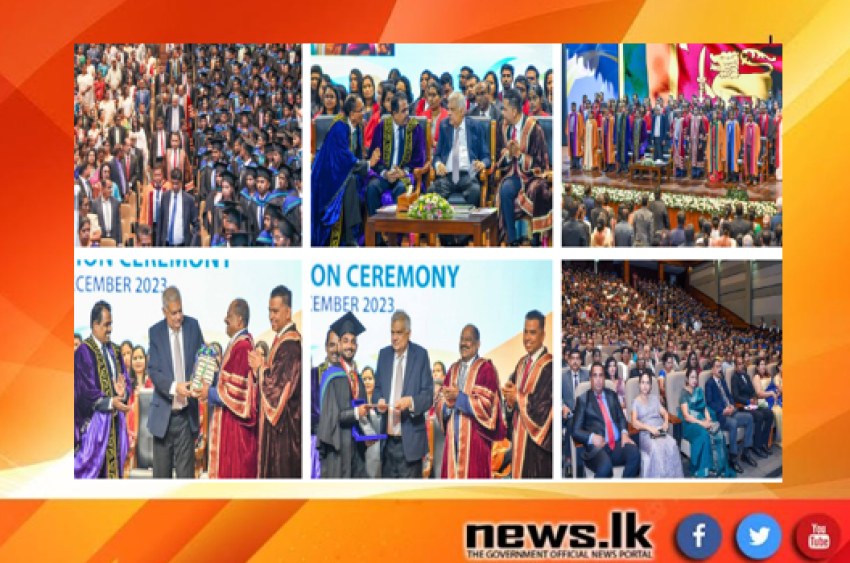President Ranil Wickremesinghe announced that a program focusing on utilizing both university education and vocational training for the country’s development will commence next year. Emphasizing the need for a knowledgeable human resource to propel the nation forward, he assigned the responsibility to the university and vocational training sectors in Sri Lanka. The President highlighted the extended support from the private sector for a transformative shift in vocational training education and the imminent introduction of laws to reorganize the entire education system in the country.
These remarks were made during President Ranil Wickremesinghe’s presence at the 2023 graduation ceremony of the National Institute of Business Studies (NSBM Green University). As part of the ceremony, the President inaugurated a new stadium and awarded 06 students who demonstrated outstanding skills among the 176 graduates. In a celebratory gesture, NSBM Green University Vice Chancellor E. Mr. A. Weerasinghe presented a collection of valuable books to President Ranil Wickremesinghe.
Addressing the gathering, President Wickremesinghe said;
We aim to revolutionize university education to ensure that every graduate secures employment. Currently, the admission of students to government universities is restricted due to logistical challenges. However, other nations have effectively addressed this issue, aligning with the United Nations Declaration of Human Rights, which asserts the right of everyone to access education. In line with this, governments and private entities worldwide have established universities. As Sri Lanka, we are now prepared to undertake this task.
Our goal is to significantly increase the number of universities in the country, potentially doubling or tripling their current count. Simultaneously, leveraging new technology allows students in Sri Lanka the opportunity to earn degrees from foreign universities without leaving the country.
We envision Sri Lanka becoming a hub for universities. Additionally, we aspire to complete the task of imparting English proficiency to both school and university students by 2030. Furthermore, we seek to equip students in our country with knowledge of additional languages.
In our efforts, we plan to establish vocational training colleges by merging existing vocational training institutes. To enhance employability, we are introducing job-oriented curricula for these courses. Encouragingly, the private sector has pledged support for these initiatives, and we anticipate implementing this program by the coming year.
After that, it is our expectation to bring the necessary laws to reorganize the entire education system in this country. Thus, it should be said that our aim is to start the program of using university education and vocational training education for the development of this country from next year, as knowledge is needed to develop the country. A new education system should be created for that.
We should act as a middle income country. We have to decide whether we will remain in this state forever, or whether we will become a high income economy. We all want to go on that journey. So we leave it to education to build the necessary human resources.
Mr Nihal Ranasinghe, Secretary of the Ministry of Education, NSBM Green University Vice Chancellor E. A. Weerasinghe, Deputy Vice-Chancellor Professor Chaminda Ratnayake, deans and academic staff and parents of graduate students participated in this event.




















